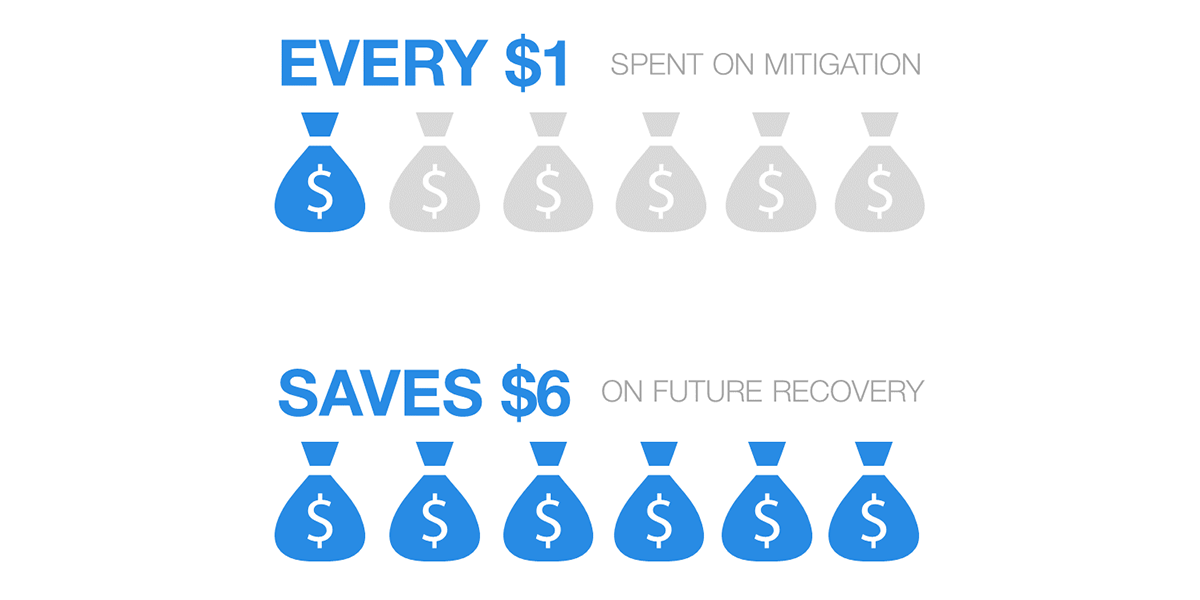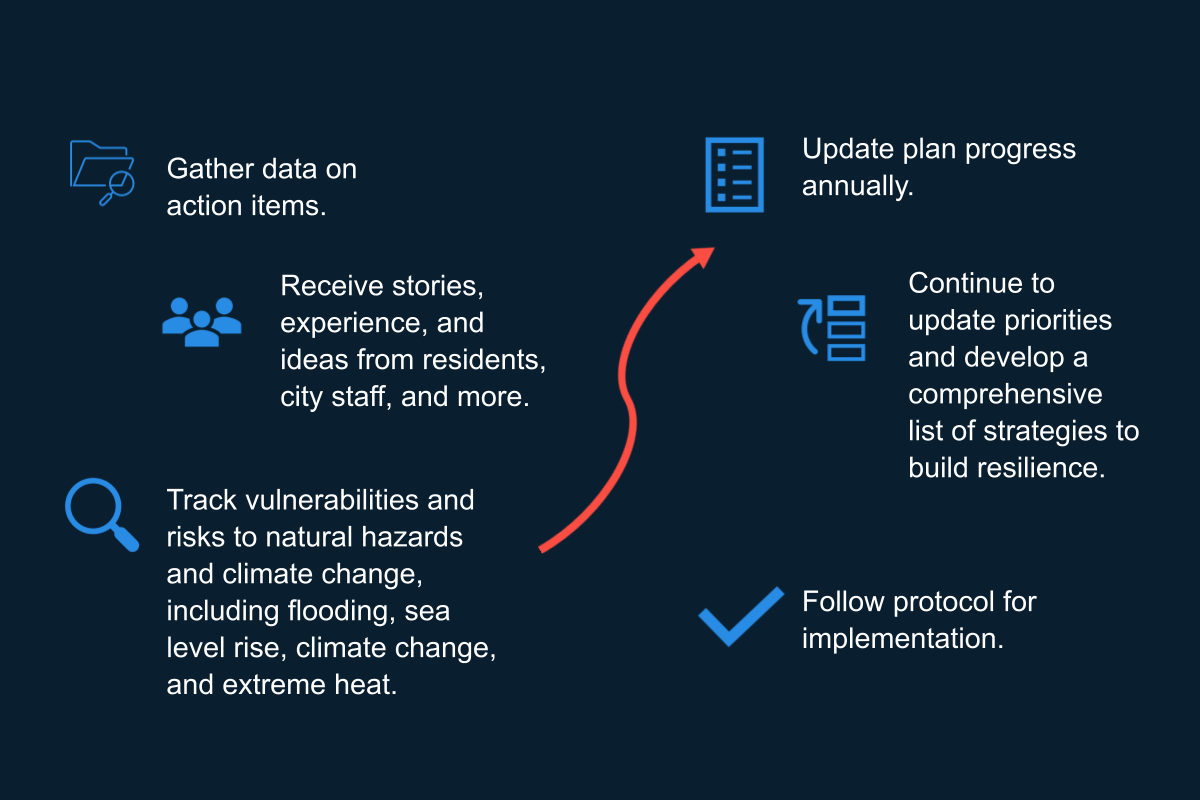Natural Hazard Mitigation Plan
We're working to reduce or eliminate the City’s projected risks associated with natural disasters, and to adapt to a changing climate.
The City of Boston, through of the Office of Emergency Management, has had their 2021 Natural Hazard Mitigation Plan update adopted by City Council and approved by FEMA. You can learn more about our plan update process, initiatives, and how to get involved below.
About the planning
What is Hazard Mitigation Planning?
As a coastal and dense city, Boston is vulnerable to:
- flooding
- sea level rise, and
- urban heat islands, among many other natural hazards.
A hazard mitigation plan sets out to identify the risks and vulnerabilities associated with natural disasters. These include the impact on homes, businesses, and critical infrastructure that keeps Boston running. We will take a look at historic hazard events, as well as research on climate change projections for Boston. Our goal is to pinpoint areas that need protection. We will then develop strategies to mitigate damages from natural hazard events.
Boston residents are stakeholders in this planning process. Your input and ideas for becoming more resilient will be valuable to our process. We hope you will join us and read about ways to get involved below.
WHY DEVELOP A HAZARD MITIGATION PLAN?
When updating the 2014 Hazard Mitigation Plan, our goals will be to:
- protect the health and safety of the public
- protect existing properties and structures
- increase resilience by protecting and enhancing natural resources
- ensure that essential services can function during and after a hazard event
- work regionally to mitigate impacts from natural hazards and to respond and recover from hazard events
- determine priorities for directing resources for hazard mitigation and response, and
- maintain hazard awareness.
did you know?
The National Institute of Building Sciences estimates that every $1 of federal grants spent on mitigation saves $6 in recovery costs after an extreme event.
The process
Get involved
Your experiences of previous natural hazard events are critical to understanding our vulnerability across Boston. As we continue planning in this area your voice and ideas will help us continue on a path forward.
Ways to add your voice now:
Take these quick steps to help the City plan for a more resilient future:
- Review our 2021 updated version of the Natural Hazard Mitigation Plan. For a brief overview you can also take a look at the executive summary of the updated plan.
- Check out our Public Meeting Videos: Public Meeting 1 (May 5, 2021) and Public Meeting 2 (June 22, 2021)
- Follow the hashtag #ResilientBoston on social media.
- Send your questions or comments to EngageOEM@boston.gov
- Add your email to our contact list. You'll get notified as opportunities to get involved are posted and sign up for AlertBoston.
Coordination
We’re staying coordinated with other ongoing and completed planning efforts.
Future funding
The Federal Emergency Management Agency (FEMA) approved 2021 NHMP update makes the City of Boston eligible for FEMA grants. We can use those grants to put in place the strategies identified in the final report. The City is also looking for additional grant sources by incorporating climate adaptation planning into the Hazard Mitigation Plan update. These sources include the state's Municipal Vulnerability Preparedness (MVP) grant program.
Common questions
QuestionsPeriodic planning ensures that Boston’s hazard mitigation efforts are focused on today’s priorities. Investing in hazard mitigation can save lives and recovery resources, like money and time. Hazard mitigation aims to reduce the risk of hazard events. We want to ultimately lead to stronger communities that are prepared to shelter in place, but also to evacuate when necessary.
In addition, the Federal Emergency Management Agency (FEMA) requires the City to update their Natural Hazard Mitigation Plan every five years to remain eligible for funding. Through this update, the Boston will remain eligible for FEMA emergency and grant funding to improve the City’s resilience!
The NHMP will identify ways to reduce or mitigate impacts of hazards. We recognize that steps can be taken to better prepare for future pandemics, although this is not the current aim of the NHMP.
Our frontline workers who are busy responding to the current pandemic will be integral stakeholders of future planning efforts. In the meantime, we are collecting community input and experiences through our online survey. This feedback will help inform how we consider pandemic planning in relation to mitigating natural hazards.
The NHMP is not part of Climate Ready Boston. But, we are staying coordinated with this initiative and other related efforts. The NHMP focuses on the City’s current vulnerability and risks. It uses experiences from historic events to inform future planning. However, we know that all investments should account for climate change. Therefore, we are incorporating findings from Climate Ready Boston related to:
- heat
- increased precipitation and flooding, and
- sea level rise and coastal surge.
The NHMP will also consider other risks that were not a focus of Climate Ready Boston. These include winter weather and earthquakes.
A Natural Hazard Mitigation Plan identifies the risks and vulnerabilities associated with natural disasters. These include the impact on:
- homes
- businesses, and
- critical infrastructure that keeps Boston running.
We assessed historic hazard events and researched climate change projections for Boston. We have pinpointed areas that need protection and develop strategies to mitigate damages. The hazards assessed in this plan include:
- flooding
- winter weather
- extreme wind events
- extreme temperatures
- fire
- geologic hazards, and
- drought.
Equity, inclusion, and access were key parts of this project. They informed the team’s approach to:
- outreach and engagement
- mapping analyses, and
- the identification and prioritization of adaptation action items to support vulnerable residents.
The Natural Hazard Mitigation Plan focuses on natural (geologic and weather-related) hazards. It does not include information on pandemics. However, we recognize that steps can be taken to better prepare for future pandemics. We collected community input and experiences to help inform how the City considers pandemic planning in relation to mitigating natural hazards.
The Natural Hazard Mitigation Plan is also not part of Climate Ready Boston, but rather a coordinated effort.



